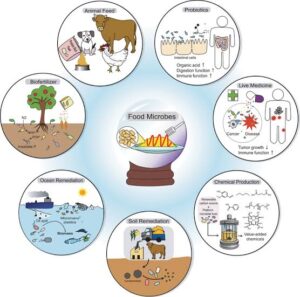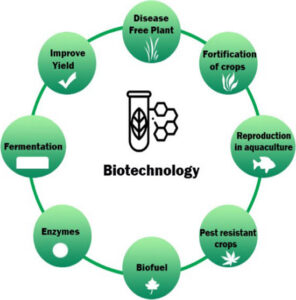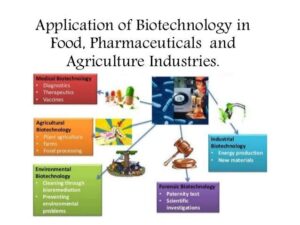Back to: MICROBIOLOGY 100 LEVEL
Welcome to class!
Hello there, superstar! I’m truly proud of the effort you’re putting into your studies. You’ve been doing so well, and today, you’re going to discover something both exciting and inspiring—how microorganisms are used in food production, biotechnology, and medicine. Yes, those tiny, invisible organisms are helping us in powerful and life-changing ways!
Use In Food Production, Biotechnology, And Medicine
Use of Microorganisms in Food Production
Microbes are not always harmful—in fact, some are our friends. Microorganisms like bacteria, fungi, and yeasts are used to prepare some of our favourite foods here in Nigeria and around the world.

Fermentation is the key process here. It’s when microbes break down food substances, changing their flavour, texture, or keeping them from spoiling.
Examples you’ll recognise:
Yoghurt – Made using Lactobacillus bacteria that ferment milk.
Cheese – Made by using special bacteria and fungi to solidify and flavour milk.
Bread – Yeast (Saccharomyces cerevisiae) helps the dough rise by releasing carbon dioxide.
Pito and palm wine – Traditional African drinks made through fermentation by yeast.
These foods are not only tastier but also easier to digest and sometimes even more nutritious!
Use in Biotechnology
Biotechnology means using living things, like microbes, to make useful products. Microorganisms are stars in this area because they grow fast and can be engineered to do amazing things.

Examples:
Genetic engineering – Bacteria like E. coli are used to produce human insulin for diabetic patients.
Biofuel production – Certain microbes can convert waste into energy, such as producing ethanol from cassava or maize.
Bioremediation – Using bacteria to clean up oil spills or polluted soil and water.
Just imagine: tiny microbes cleaning up the environment and creating fuel from waste!
Use in Medicine
This is one of the most important contributions of microbes. Without them, modern medicine wouldn’t be the same.
Antibiotics – Life-saving drugs like penicillin are made by fungi (Penicillium notatum).
Vaccines – Microbes are used to create vaccines that train our immune system to fight diseases like polio, measles, and COVID-19.
Probiotics – Good bacteria taken as medicine to help with digestion and boost the immune system.
Research – Microbes are used in labs to test new drugs and study diseases.

Just like a skilled tailor uses thread and fabric to create beautiful clothes, scientists use microbes to “tailor” food, medicine, and even fuel. These tiny helpers are working behind the scenes to improve our lives daily!
Summary
- Microorganisms are used in food production to ferment and preserve food like yoghurt, bread, and local drinks.
- In biotechnology, they help in genetic engineering, biofuel production, and environmental clean-up.
- In medicine, they are used to make antibiotics, vaccines, and probiotics.
- Microbes are powerful tools for solving human problems when used wisely.
Evaluation
- Give two examples of foods made using microorganisms.
- What is fermentation?
- Mention two ways microbes are used in biotechnology.
- How are microbes helpful in medicine?
- What organism produces penicillin?
You’re learning how the tiniest creatures are making the biggest impact in our world—from your kitchen to the laboratory. Keep going strong—Afrilearn is here to help you shine brighter every day. You’ve got this!
